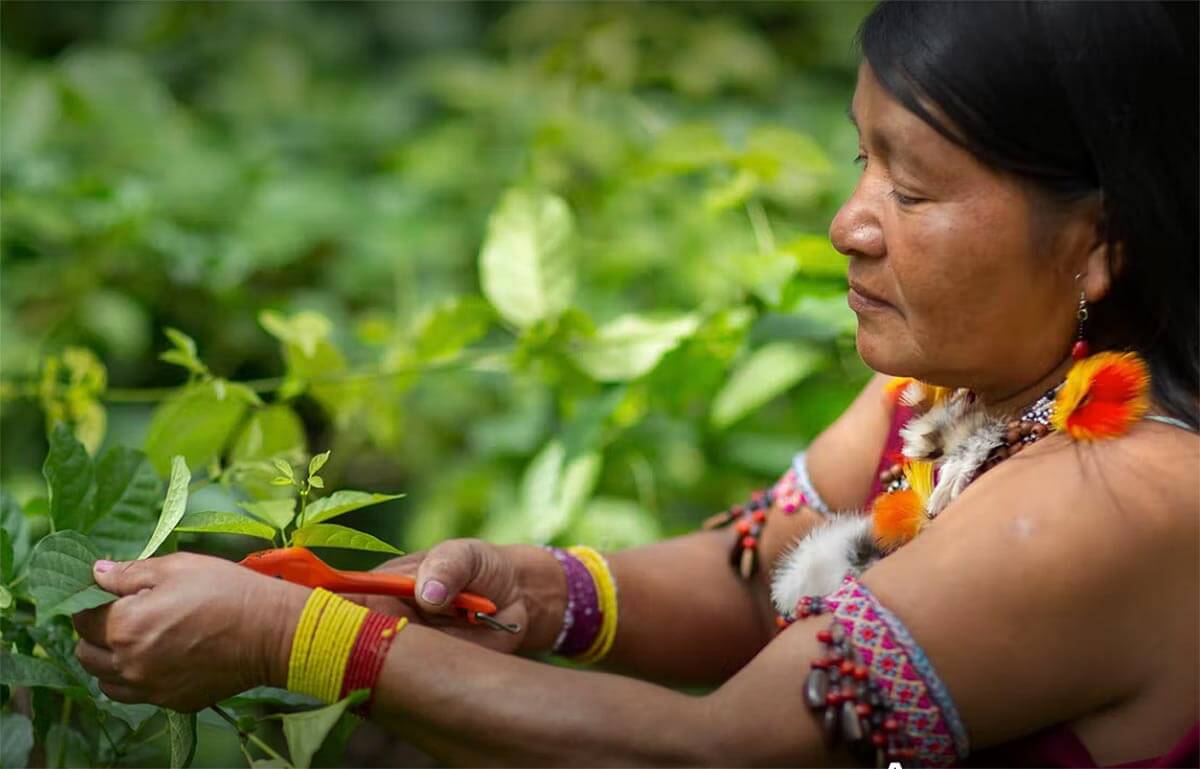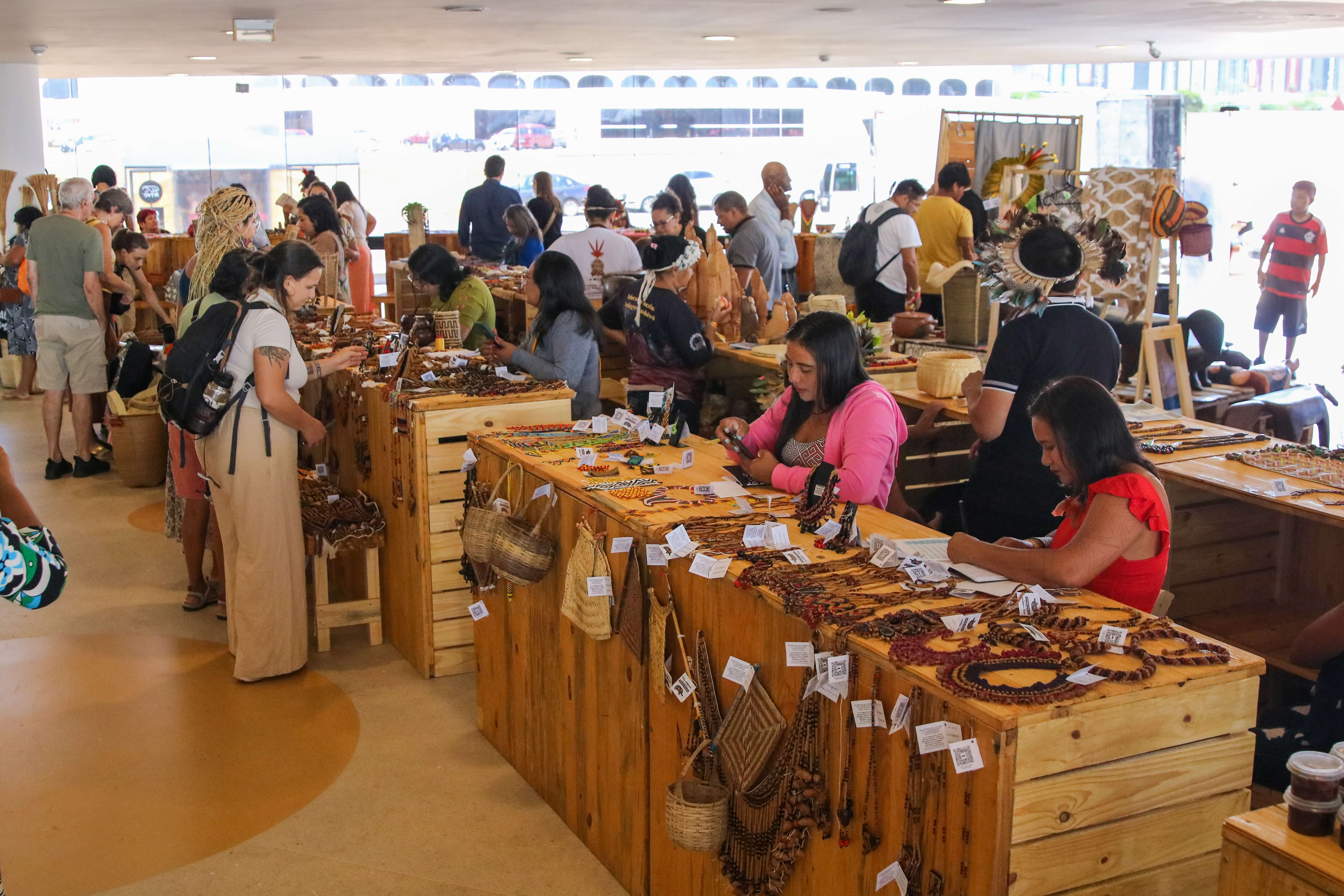Ancestry with a glance into the future: the indigenous economy is an inspiration for development with sustainability
Ancestral knowledge and the intrinsic relation of indigenous peoples with the environment offer innovative and resilient approaches to the economic, social, and environmental challenges highlighted in the G20 agenda during the Brazilian Presidency. The 2015 Paris Agreement gave scientific endorsement to the knowledge of indigenous peoples, the basis for the production of various products and medicines, such as aspirin and morphine.
“We are doing this for our descendants. The people of the future depend on us. Our grandchildren, great-grandchildren. I never agreed with deforestation, with the extraction of lumber, ore, gold, exploitation, and destruction. I worry that white men will continue engaging in this kind of activity. We can feel the changes in the climate, the heat. I worry that, if this goes on, we will have serious problems in the world".
This was said by Raoni Metuktire, known as Chief Raoni, an indigenous leader from the kayapó ethnicity, who at the end of March was granted the title of knight of France’s Honour League by the hands of French president Emmanuel Macron, during his official visit to Brasil. His speech assertively translated one of the main historical demands of the indigenous peoples, which has become central to all the peoples of the world, due to the increasing social and environmental disorders: the need to create a new development model with criteria of sustainability and inclusion.
It is impossible to think about sustainability without considering the protagonism of traditional communities and indigenous peoples, whose dynamics and ways of life contemplate millennium-old contributions to the discourse.
Sustainable development and indigenous bioeconomy
While some may consider sustainable development as a complex or rather restrictive idea to be included in the conversations held in the economic field, Adriana Ramos, Executive Secretary of the Instituto Socioambiental (ISA), introduced the concept in a simple and interdisciplinary manner. “Sustainable development assumes that there is a balance between conservation, the economy, people’s well-being, and the perspective of the future of the Planet”, she explained.
While some may consider sustainable development as a complex or rather restrictive idea to be included in the conversations held in the economic field, Adriana Ramos, Executive Secretary of the Instituto Socioambiental (ISA), introduced the concept in a simple and interdisciplinary manner. “Sustainable development assumes that there is a balance between conservation, the economy, people’s well-being, and the perspective of the future of the Planet”, she explained.
Bioeconomy, for example, is a model under construction that recognizes and fosters indigenous approaches to development; it is already considered a rational and consistent path for the long run. This year, given the importance of the matter, the Brasil G20 Presidency launched the Global Bioeconomy Initiative.

The definition of bioeconomy is closely related to its processes, more so than its products, since it is during the production stage that ancestral technologies and knowledge are applied. There can be various products, depending on the culture of each community, including foods, clothing, and ceramics, among others.
Aggregating the notorious contribution of ancestral knowledge and the indigenous peoples’ productive making of the past and present, bioeconomy is an alternative to the current usual models. It unites natural resources and new technologies to provide more sustainable products and services.
“Brasil looks at this issue through the perspective of the forested countries, with their multiple diversities, who defend a sustainable use of diversity, conservation, and regeneration as intrinsic parts of bioeconomy”, highlights Carina Mendonça Pimenta, National Secretary of Bioeconomy of the Brazilian Ministry of the Environment and Climate Change (MMA). “It is a perspective that understands traditional and indigenous peoples as part of the bioeconomy, seeking mechanisms to promote it, generating increased prosperity and well-being”, concluded the MMA Secretary.
The 20215 Paris Agreement gave scientific endorsement to the knowledge of indigenous peoples creating an important milestone in legitimizing this wisdom. However, this knowledge has been replicated by the world industry for centuries. In pharmaceutical production, a prime example of this is aspirin, derived from the bark of the willow tree, and morphine, extracted from poppy seeds.
“Bioeconomy is the forest’s regenerative and inclusive economy. It is the economy of sociobiodiversity, produced by the indigenous peoples. It is an economy of knowledge, an economy of social and environmental services”, advocated Adriana Ramos during the Brasil é Terra Indígena [Brasil is Indigenous Land] Festival, which took place in Brasília last December.
Ancestral economy
Because the economy hinges on the preservation of natural resources, it inherently depends on indigenous communities. Delving into the intricate relationship between traditional economic practices and the rich sociobiodiversity of indigenous cultures, including the imperative of sustainability within their communities and cooperative frameworks, presents us with innovative and robust solutions to confront the challenges posed by neoliberalism—a key focus of this year's G20 agenda.

“Ancestral economy helps us demonstrate that the economy has more to do with reciprocity, with exchanges, with valuing knowledge, with empowerment”, stressed Lucia Alberta, an indigenous woman from the Baré people, director of Sustainable Development Promotion of the Brazilian Indigenous Peoples Foundation (Fundação Nacional dos Povos Indígenas - Funai). “The foundation of bioeconomy must go beyond the concept of income generation, transcending the logic of financial profit”, she alerted.
During Chief Raoni’s decoration event, President Lula stressed the understanding that indigenous knowledge must not be limited to the preservationist agenda and that the indigenous peoples must be included in the process of building this new model. “We want to share the exploration and research of our rich biodiversity— all the riches we have here— with the world; but the indigenous peoples must take part in everything that will be produced from the land in which they live”, stated the President.
In 2025 Brasil will host the UN 30th Conference on Climate Change (COP30), which will take place in the city of Belém, in the state of Pará. “Now we are going to discuss the importance of the Amazon inside the Amazon. We will discuss indigenous issues while seeing the indigenous peoples. We will discuss the issues of the riverside communities while seeing the riverside communities and how they live", declared President Lula.